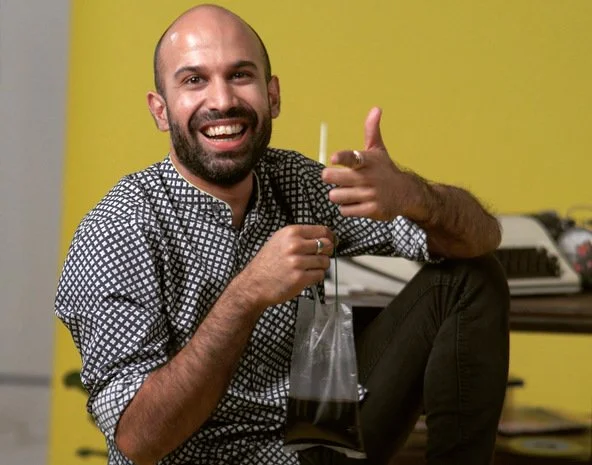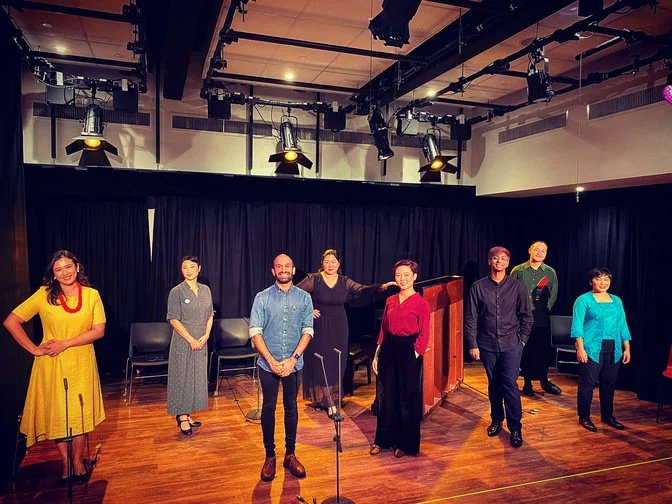Shridar Mani: Connecting the Dots in the Most Unlikely
Shridar Mani Credit: Shridar Mani
Shridar Mani has accumulated an array of experiences, from working with large art institutions to producing independently. Fuelled by his love for opera, he co-founded The Opera People with David Charles Tay and Jonathan Charles Tay in 2018. He is also currently a Senior Programmes Manager at National Gallery Singapore.
Q: We understand that you were singing for quite some time before becoming a producer, so how did you get started in creative producing?
Actually, it was kind of by chance. When I was in university, I used to help the music department organise some of their vocal concerts. Before I moved back to Singapore, I was with the Chicago Symphony Orchestra for a year. I was on a fellowship with them working on the archives and that was where I got to know about arts management and administration.
When I came back to Singapore and joined Esplanade, I started doing more programming with them. I thought it would be just a short-term thing and it ended up being for more than ten years. What’s important for me is that as a programmer or creative producer, I get to have a bigger role in shaping and curating experiences in the ways in which artists and audiences can connect and how content can be delivered effectively, interestingly, and meaningfully to audiences. These were the things I found are big priorities for me more than just the performing part of it. That was how I decided to stick to creative producing and made it my main thing.
Q: Personally, we don’t know much about opera because it is not common in the context of Singapore and Asia but we’re very curious about your love for opera.
I lived overseas for a long time when I was growing up. I moved to Tokyo when I was 13 and I started singing in choirs. Two years after that, I moved to New York and continued to sing in choirs and took up voice lessons. Then, my voice lesson teacher told me to check out opera. At that time, Metropolitan Opera - the biggest opera company - was in New York. They used to have student tickets so I used to be able to watch shows for quite cheap. I would save up my pocket money to go and watch. I just fell in love with it like that. And I continued singing for a long time after that, even when I was in university. In university, I was a double major in sciences and music but eventually, I had to drop the sciences to focus on music.
When I moved back to Singapore, an ex-music teacher of mine had started her own opera company here which was the second opera group at that time. I helped her a lot with setting up the company and their productions for about five years. Then in 2018, three of us from this company started The Opera People.
Q: With your experience and long years working at large institutions, what inspired you to found your own company? Were there some challenges that you faced in this transition?
A lot of why we started The Opera People was to fill certain gaps in the scene. With the 3 of us - me, Jonathan and David - as the co-founders, I think we each wanted to plug certain gaps and niches especially in the classical vocal scene. There were, of course, things happening but we felt like they were sometimes not the right things.
Jonathan is very interested in developing the singers - how do we create a space that is safe for them to challenge and push themselves. For David, it was very much about how we can rethink some of the ways that we present things. For example, what does Netflix do successfully that opera doesn’t and how do we bring some of those ideas and philosophies to the kinds of presentations that we do. For me, it was about how we connect opera to contemporary voice, issues and ideas. How we can make it relevant, not just by updating it but always drawing it back to Singapore audiences and the things that they connect with and how do we get them thinking.
Challenge-wise, financials will always be a huge challenge, especially because we don't have long-term company funding. Everything is on a project-basis. However, we’re very lucky in that we have built very good support over the last couple of years. We’ve been able to make things work financially in the last two years, which is very good. Another thing is manpower. I am not able to do this as a full-time paid job yet even though the work is full-time, so juggling my time is also a personal challenge.
Q: When The Opera People first started out, what was the initial public reaction and what did you do to bridge the gap of the impression of opera?
The initial responses were very good. We made our debut performance quite quickly and it did really well. One of the things we really focused on was to start with a core audience rather than trying to hit too many bases at once. We have built our programmes slowly over the years too. The scene felt encouraged seeing The Opera People too. It was like a new generation taking over as well. What we have noticed and some feedback I’ve gotten over the last few productions is that our audience is much younger than the typical opera audience.
Dwarf Credit: The Opera People
I think firstly, the people on stage are younger so younger people feel more of a connection to them. Secondly, we address issues and ideas that young people are more interested in, like xenophobia, HIV, or feminism. I think we have brought it to a level where people can see the connections a lot more strongly than they would in a very formal concert setting. That has always been our aesthetic, we want to do things unconventionally so that we break down some of the walls and barriers so we can get more people interested.
Q: With your works focusing on highlighting socio-cultural issues, what are some factors that you have to consider when producing such works?
The most important thing is having a diversity of voices in the creative process and in the work itself. At The Opera People, we have a song-recital series In Our Manner of Speaking that we started in 2018 that looks at socio-cultural issues. The first edition that we did was in commemoration of Clara Schumann's 200th birthday and was meant to centre around female composers.
In Our Manner of Speaking: Reclaimed Lands Credit: The Opera People
When we were putting the show together, it wasn’t as simple as just having female composers but also how we highlight the voices of women through the songs. We had songs from 200 years ago to the more contemporary Nina Simone from 40 years ago and we had Pooja Nansi be the reader, who connected it through contemporary poems. It was about how we can bring all these different things together, find all the threads that can connect them so that we can show the audience a bigger picture rather than just individual pieces.
Q: What do you think opera can bring to the local arts ecosystem?
Opera is an important artform. It is a western artform that has come here through us being a colony but what I think is very essential to opera is that it’s a multidisciplinary genre. It puts in dialogue a lot of different forms. So what I think opera can bring to the local scene here is the aesthetics and the philosophies of how you bring together different disciplines and forms and have them converse with each other in a way that is authentic, natural and meaningful.
Q: What can we look forward to from you personally and The Opera People?
Me and Conductor Lien Boon Hua are planning a series of concerts with The Wayfarer Sinfonietta, a new chamber orchestra that we started and we just had our debut concert in September 2021 - The Unknown Woman - in September 2021. We’re exploring new chamber orchestra repertoires, mostly because the pandemic doesn’t allow us to bring big orchestras to come together. But it doesn’t mean we can do good, interesting programmes that also go beyond the standard concert programme.
With The Opera People, what is exciting is the more developmental work that we are able to do instead of just presenting shows in 2022. We are planning for an opera director workshop and we are hoping to do an opera workshop for children with local composer Chen Zhangyi.
Shoutout
My shoutout would definitely be Fezhah Maznan. I think she is fantastic at what she does. She has so much passion and drive, I think more than I do. We have worked together a lot in various organisations and on our own. She is someone who constantly challenges me to be better at what I do. I think that is really important for a healthy and sustainable community, it’s for us to constantly learn from each other but also challenge each other, and to keep pushing each other to be better versions of ourselves. And Fezhah is really someone that does that for me.
Interview by: Pearlyn Tay



